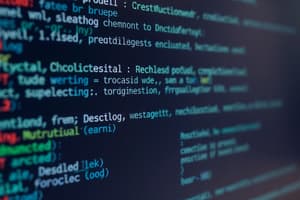Podcast
Questions and Answers
What part of an IP address indicates which network the address belongs to?
What part of an IP address indicates which network the address belongs to?
- Network portion (correct)
- Source MAC address
- Host portion
- Destination MAC address
The data link frame is sent directly to the destination device, regardless of whether it is on the same network or a remote network.
The data link frame is sent directly to the destination device, regardless of whether it is on the same network or a remote network.
False (B)
What is the function of the default gateway in network communication?
What is the function of the default gateway in network communication?
To route traffic to remote networks by forwarding data to the nearest router.
The MAC address of the sending device is referred to as the __________.
The MAC address of the sending device is referred to as the __________.
Match the following terms with their definitions:
Match the following terms with their definitions:
Which protocol is used to send and receive web pages between a web server and a web client?
Which protocol is used to send and receive web pages between a web server and a web client?
All network protocols operate solely in the application layer.
All network protocols operate solely in the application layer.
Name one common networking protocol.
Name one common networking protocol.
Which of the following elements is NOT common to all communication methods?
Which of the following elements is NOT common to all communication methods?
The __________ protocol manages the individual conversations between devices during a network communication.
The __________ protocol manages the individual conversations between devices during a network communication.
Protocols are unnecessary for effective communication.
Protocols are unnecessary for effective communication.
Match the following protocols with their respective functions:
Match the following protocols with their respective functions:
What are the three primary elements of communication?
What are the three primary elements of communication?
What process involves adding an IP source and destination address during data transmission?
What process involves adding an IP source and destination address during data transmission?
Protocols typically define message encoding, delivery options, and _____ requirements.
Protocols typically define message encoding, delivery options, and _____ requirements.
Match each protocol characteristic with its description:
Match each protocol characteristic with its description:
What is the process called of putting a message into an addressed envelope before sending it over a network?
What is the process called of putting a message into an addressed envelope before sending it over a network?
Ethernet only deals with the physical aspects of data transmission.
Ethernet only deals with the physical aspects of data transmission.
What is the role of protocols in network communication?
What is the role of protocols in network communication?
What is the first step in sending data from a web server to a client?
What is the first step in sending data from a web server to a client?
A broadcast message is delivered one-to-one.
A broadcast message is delivered one-to-one.
Message size restrictions require the source to send messages in one piece.
Message size restrictions require the source to send messages in one piece.
What must happen to long messages before they are sent across a network?
What must happen to long messages before they are sent across a network?
What are two examples of message delivery options defined by protocols?
What are two examples of message delivery options defined by protocols?
A frame provides ________ address and source address for proper delivery.
A frame provides ________ address and source address for proper delivery.
Which method allows hosts to negotiate timing to avoid overwhelming the destination?
Which method allows hosts to negotiate timing to avoid overwhelming the destination?
Match the message delivery options with their definitions:
Match the message delivery options with their definitions:
Each frame sent over a network does not require its own addressing information.
Each frame sent over a network does not require its own addressing information.
What is the first step a sending host does when transmitting a message?
What is the first step a sending host does when transmitting a message?
What is one benefit of using a layered model in networking?
What is one benefit of using a layered model in networking?
The Protocol Data Unit (PDU) for the Transport layer is called a segment.
The Protocol Data Unit (PDU) for the Transport layer is called a segment.
What type of protocol does the Application layer in the OSI model contain?
What type of protocol does the Application layer in the OSI model contain?
The _____ provides services to exchange individual pieces of data over the network between identified end devices.
The _____ provides services to exchange individual pieces of data over the network between identified end devices.
Match the OSI model layers with their corresponding functionalities:
Match the OSI model layers with their corresponding functionalities:
Which model was created in the early 1970s for internetwork communications?
Which model was created in the early 1970s for internetwork communications?
The OSI model consists of more layers compared to the TCP/IP model.
The OSI model consists of more layers compared to the TCP/IP model.
What is one characteristic of the TCP/IP Protocol Model?
What is one characteristic of the TCP/IP Protocol Model?
Flashcards are hidden until you start studying
Study Notes
Rules of Communication
- Communication involves a source, destination, and a channel, all governed by rules or protocols.
- Protocols ensure effective communication by identifying the sender and receiver, establishing a common language, defining delivery speed and timing, and outlining confirmation or acknowledgment requirements.
- Protocols also define message encoding, delivery options (unicast, multicast, broadcast), formatting, encapsulation, timing, and size restrictions.
Message Encoding
- Encoding converts information into a format suitable for transmission.
- Sending hosts convert messages into bits.
- Encoding can involve sounds, light waves, or electrical impulses, depending on the network medium.
- The destination host then decodes and interprets the message received.
Message Formatting and Encapsulation
- Messages are encapsulated into specific formats called 'frames' before being sent over the network.
- Frames act like envelopes, containing destination and source addresses.
Message Size
- Long messages are broken into smaller pieces called 'frames' to be sent individually across a network, each with its own addressing information.
- The receiving host reconstructs the original message from the multiple frames.
Message Timing
- Access Method: Hosts need rules to determine when they can send messages and how to handle collisions.
- Flow Control: Source and destination hosts use flow control to ensure appropriate timing, preventing data overload and guaranteeing successful delivery.
- Response Timeout: Network protocols define how long hosts wait for responses and the actions taken if a timeout occurs.
Message Delivery Options
- Unicast: One-to-one delivery.
- Multicast: One-to-many delivery.
- Broadcast: One-to-all delivery.
Network Protocols and Standards
- Protocol suites, implemented in software, hardware, or both, govern communications between devices.
- Network protocols define common formats and rules for exchanging messages, examples include HTTP, TCP, and IP.
Protocol Interaction
- Communication between a web server and web client involves multiple protocols working together, including HTTP, TCP, IP, and Ethernet.
TCP/IP Protocol Suite
- This suite is widely used for internet communications.
- It comprises four layers: Application, Transport, Internet, and Network Access.
Standards Organizations
- Organizations like ISO, ITU-T, and IETF create and manage networking standards.
- Standards ensure interoperability between different devices and networks.
Reference Models
- Layered models provide a framework for protocol design, fostering competition and preventing technology changes in one layer from affecting others.
OSI Reference Model
- This model features seven layers: Application, Presentation, Session, Transport, Network, Data Link, and Physical.
TCP/IP Protocol Model
- This model, also known as the Internet Model, has four layers: Application, Transport, Internet, and Network Access.
OSI and TCP/IP Model Comparison
- The OSI model incorporates the TCP/IP model, but with some additional layers for specific functions.
Data Transfer
- Data is encapsulated into frames for transmission across a network.
- Devices on the same network communicate directly using MAC addresses.
- Devices on different networks communicate through a default gateway or router, which handles addressing and forwarding.
- When forwarded, the data is encapsulated within a new data link frame by each router.
- Network addresses (IP addresses) indicate source and destination networks.
- Local hosts access local resources using network and MAC addresses.
- Data is sent to the default gateway for access to remote networks.
Studying That Suits You
Use AI to generate personalized quizzes and flashcards to suit your learning preferences.




